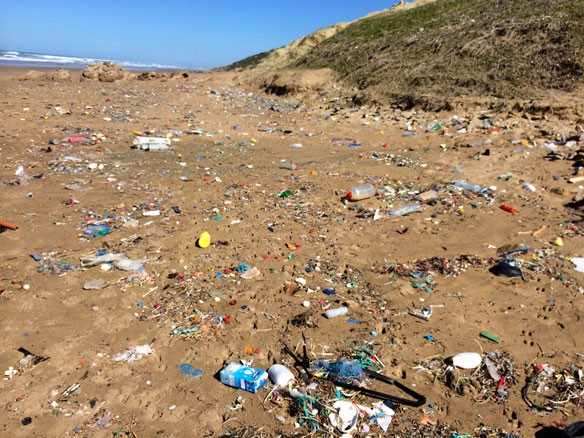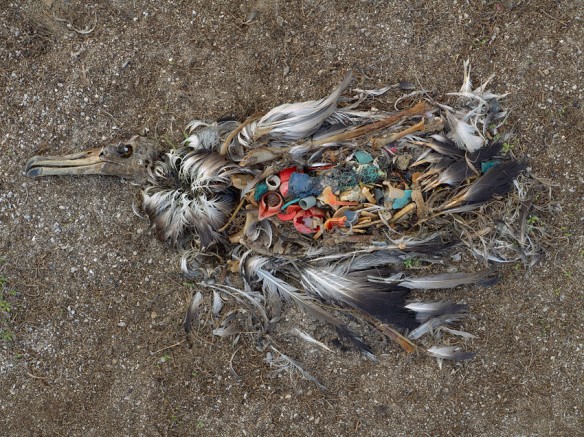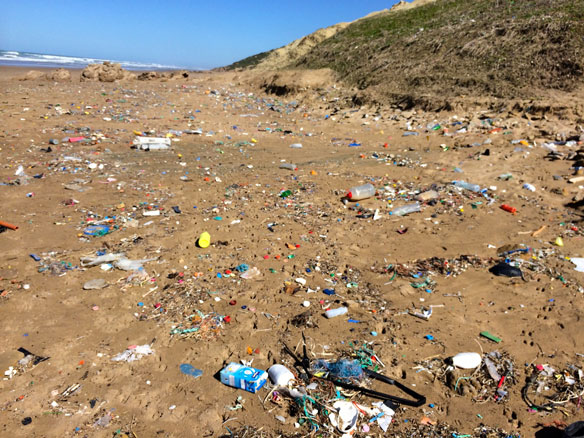
“The unprecedented plastic waste tide plaguing our oceans and shores, can become as limited as our chosen relationship with plastics, which involves a dramatic behavioral change on our part…”
Captions and Photo: © SAF — Coastal Care
Excerpts;
When it comes to throwing away rubbish, “away” is not some abstract space but a real location… About eight million tonnes of plastic waste are added to the oceans every year. An Exeter University research estimated that anyone consuming an average amount of seafood would ingest about 11,000 plastic particles a year.
Here’s How Much Plastic Ends Up In the World’s Oceans,The Time (02-13-2015)
Every year, 8 million metric tons of plastic end up in our oceans, it’s equivalent to five grocery bags filled with plastic for every foot of coastline…
Global Impact of Debris on Marine Life Studied, (02-19-2015)
Nearly 700 species of marine animal have been recorded as having encountered humanmade debris such as plastic and glass according to the most comprehensive impact study in more than a decade…
Biodegradable Plastics Are as Persistent as Regular Plastics, Study Finds, Yale E360 (03-19-2015)
Plastics designed to degrade don’t break down any faster than their conventional counterparts, according to research published in the journal Environmental Science and Technology…
Plastic pollution: When The Mermaids Cry: The Great Plastic Tide, Coastal Care
For more than 50 years, global production and consumption of plastics have continued to rise. An estimated 299 million tons of plastics were produced in 2013, representing a 4 percent increase over 2012, and confirming and upward trend over the past years. In 2008, our global plastic consumption worldwide has been estimated at 260 million tons, and, according to a 2012 report by Global Industry Analysts, plastic consumption is to reach 297.5 million tons by the end of 2015.
Plastic is versatile, lightweight, flexible, moisture resistant, strong, and relatively inexpensive. Those are the attractive qualities that lead us, around the world, to such a voracious appetite and over-consumption of plastic goods. However, durable and very slow to degrade, plastic materials that are used in the production of so many products all, ultimately, become waste with staying power. Our tremendous attraction to plastic, coupled with an undeniable behavioral propensity of increasingly over-consuming, discarding, littering and thus polluting, has become a combination of lethal nature… — © SAF — Coastal Care
Midway Journey II, An Environmental Tragedy Depicted

“© Midway: Message from the Gyre (2009),” from the Midway Series. Photograph courtesy of © Chris Jordan for Coastal Care’s Photo Of The Month, August 2010.
“When plastic ingestion occurs, it blocks the digestive tract, gets lodged in animals windpipes cutting airflow causing suffocation, or fills the stomach, resulting in malnutrition, starvation and potentially death. Indeed, it is found that debris often accumulates in the animals’ gut and give a false sense of fullness, causing the animal to stop eating and slowly starve to death.” —Captions and Photograph: © SAF — Coastal Care









